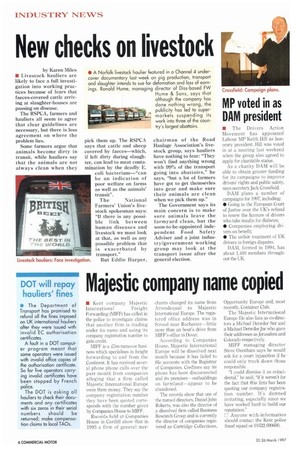New checks on livestock
Page 8

If you've noticed an error in this article please click here to report it so we can fix it.
by Karen Miles • Livestock hauliers are likely to face a full investigation into working practices because of fears that faeces-covered cattle arriving at slaughter-houses are passing on disease.
The RSPCA, farmers and hauliers all seem to agree that clear guidelines are necessary, but there is less agreement on where the problem lies.
Some farmers argue that animals become dirty in transit, while hauliers say that the animals are not always clean when they • A Norfolk livestock haulier featured in a Channel 4 under
cover documentary last week on pig production, transport and slaughter intends to sue for defamation and loss of earn
ings. Ronald Hume, managing director of Diss-based FW Hume & Sons, says that although the company has done nothing wrong, the publicity has led to supermarkets suspending its work into three of the country's largest abattoirs.
pick them up. The RSPCA says that cattle and sheep covered by faeces—which, if left dirty during slaughter, can lead to meat contamination by the deadly E. coli bacterium—"can be an indication of poor welfare on farms as well as the animals' transit".
The National Farmers' Union's livestock spokesman says: "If there is any possible link between human diseases and livestock we must look at that, as well as any possible problem that is exacerbated by transport."
But Eddie Harper, chairman of the Road Haulage Association's livestock group, says hauliers have nothing to fear: "They won't find anything wrong with 99% of the transport going into abattoirs," he says, "but a lot of farmers have got to get themsevles into gear and make sure their animals are clean when we pick them up."
The Government says its main concern is to make sure animals leave the farmyard clean, but the soon-to-be-appointed independent Food Safety Adviser and a joint industry/government working group may look at the transport issue after the general election.
















































































































